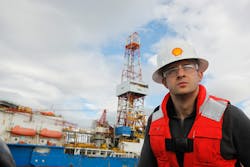During a special session on digitalization at the Offshore Technology Conference (OTC) earlier this year, it was clear just how much Shell’s oil and gas operations were embracing a variety of digital technologies to move the business forward. Although Martijn Dekker, vice president of strategy and portfolio for Shell, emphasized the need to start with a business problem in mind rather than letting the technology push you, he also urged others in the oil and gas business to grab the value from the data they already have.
“We’re using the technology that’s already there to create value today. We’re essentially using the data we already have and creating better efficiencies,” Dekker said. He stressed the importance of just jumping into the capabilities of artificial intelligence (AI) and showing the value. “We should just start doing it. That’s the way we’re approaching it in Shell. It’s infectious. After three months, they already see the benefit and value, and the cash coming back to the business.”
As its latest testament to the economic value that Shell expects to realize from AI and machine learning, the oil major has selected an AI platform from C3 IoT to enable and accelerate digital transformation on a global scale. By deploying the C3 IoT Platform globally on Microsoft Azure, Shell is looking to rapidly scale and replicate AI and machine learning applications across its upstream and downstream businesses. Shell aims to use the technologies to improve operating performance, with an emphasis on health, safety, security, environment and asset performance.
Shell will deploy the C3 IoT Platform on Azure for a broad set of AI applications, starting with predictive maintenance for hundreds of thousands of critical pieces of equipment globally, and aim to expand to support other uses cases throughout its operations with machine learning, machine vision and natural language processing.
The C3 IoT Platform enables Shell’s developers and data scientists to integrate and process Shell’s data into a unified data image kept current in real time. They will be able to rapidly develop, deploy and operate advanced AI and Internet of Things (IoT) applications across millions of Shell assets, its supply chain and markets globally. Examples of AI capabilities that Dekker mentioned at OTC ranged from inventory optimization to better use of seismic data to find more oil.
“With the C3 IoT Platform, we’re looking forward to significantly enhancing the productivity and scope of our advanced analytics capabilities to create greater economic value across Shell’s operations,” said Jay Crotts, Shell group CIO. “C3 IoT allows us to optimize our existing investments in data and cloud infrastructure while accelerating time to value of AI-based applications, so Shell can better serve our customers with even more agility and efficiency.”
The Shell agreement builds on the C3 IoT and Microsoft partnership to accelerate enterprise AI and IoT application development. With C3 IoT on Azure, Shell will perform advanced work on tier-one transactional data in the Azure cloud, including predictive maintenance, maintenance optimization, telematics, production optimization, and in the future machine vision.
“Shell’s AI- and IoT-enabled enterprise transformation will create significant customer and economic impact,” said Judson Althoff, executive vice president of Microsoft’s Worldwide Commercial Business.
The latest move from Shell reflects a growing market momentum toward platform adoption for accelerated digital transformation, according to Thomas M. Siebel, C3 IoT’s CEO. “We are excited to partner closely with Azure to support Shell’s digital transformation journey and are jointly committed to Shell’s success in applying AI and machine learning across its global business.”
Shell sees the value in experimenting, learning and failing, and trying to scale quickly when a technology is successful, Dekker said. “Digitalization is truly the next frontier for the offshore industry,” he said at OTC. “This is not about tomorrow; it’s about accelerating value for today.”
About the Author
Aaron Hand
Editor-in-Chief, ProFood World

Leaders relevant to this article:
